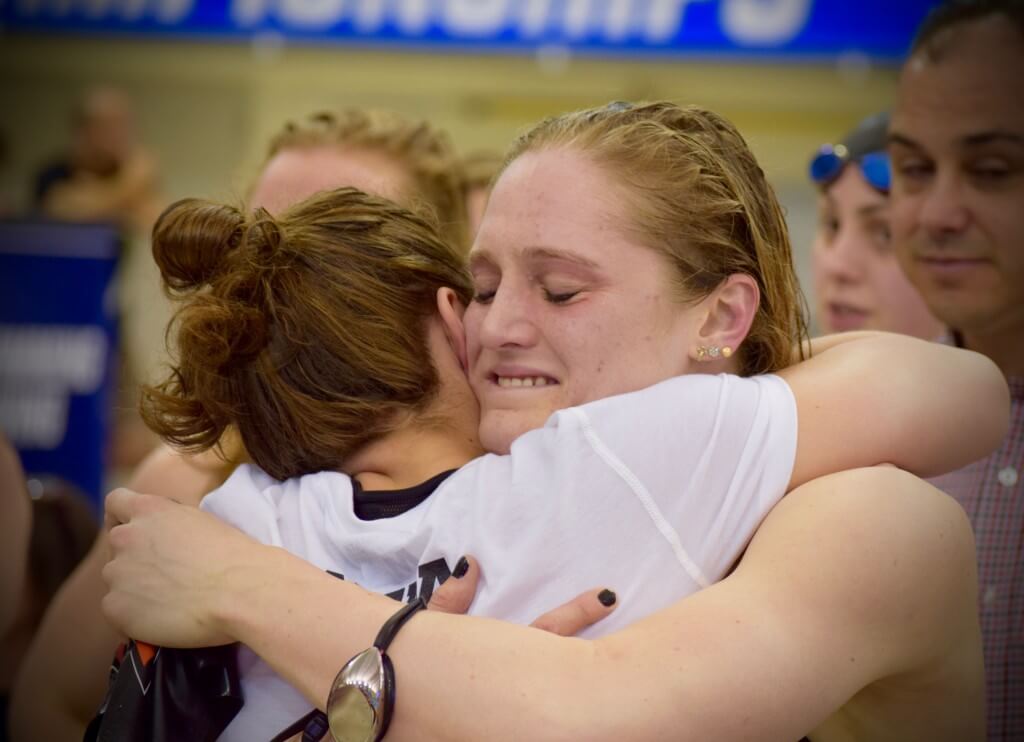Outside the Lane Lines: A Swimmer’s Life – How a Mentor Can Be an Integral Influence

Outside the Lane Lines: A Swimmer’s Life – How a Mentor Can Be an Integral Influence
By Pat Hallahan
Swimming is largely an individual sport, both in the mental and physical discipline required to succeed. Not only are you expected to follow a workout plan, but you are expected to mentally envelope yourself in the sport. Sometimes, these demands lead to early retirement – at least from a competitive standpoint (you’ll always have the pool for fitness purposes). Because of the intense nature of swimming, many accomplished athletes attribute their confidence, grit and success to a mentor who believed in them.
Mentorship in any craft is crucial for those rising through the ranks. Swimming frequently presents mental obstacles, many of which are difficult to navigate at a younger age. Having an older sibling or teammate, parent, neighbor, or, most commonly, a coach to turn to can have an immense effect on your career as a swimmer.
Countless age-group swimmers yearn to get faster and increase their efficiency in the pool without support. This approach will lead to an uphill battle. Understanding the intricacies in any given stroke and what adjustments must be made are critical for developing swimmers. Furthermore, understanding how to convey these instructions in a way that caters to the individual swimmer is equally as pivotal.
There is something spiritual about a mentor relaying positivity. Perhaps they’ll tell you that you could be special. Maybe they’ll applaud a simple correction in your stroke. Some swimmers may never receive this kind of mentorship, so it is meaningful to those who are guided.
Improving in the sport is typically dependent on an athlete’s dedication and the quality of coaching. Swimmers must decide what they ultimately want to get out of the experience. Why do mentors in the sport choose a few individuals to tutor? Maybe they see themselves in the young swimmer. Perhaps they see somebody who has a lot of potential but isn’t giving the right amount of effort.
Swimming offers minimal praise in return for the amount of work logged. Such is the sport. Practice takes up about 99% of your time. But there is fulfillment. It’s a good feeling to grind through a demanding set. It’s a good feeling to walk away knowing you gave a little extra. On days you may not feel victorious, a mentor can step in and provide that boost to bring you back. Since most swimmers are not training for the Olympic Games, we need that feeling of community, and having somebody who is there for us.
Personally, I was fortunate enough to have two mentors. Swimming was something I always did in the summers, but I wasn’t committed to the sport until high school. Something that helped me transition into taking swimming seriously was my foundation. My father taught us how to swim freestyle perfectly the moment I started to float. This memory was ingrained in me from a young age. Being the lifelong swimmer that he is, he understood the challenges of a hard practice and what it took to improve.
I was also fortunate enough to have my rec swimming coach believe in me. Praising my freestyle stroke and encouraging me to get into swimming with him year-round were tremendous influence. Having support in this sport certainly helped me realize why it’s such an amazing community.
I’m not sure I would have such an appreciation for swimming if I wasn’t encouraged the way I was, and for that guidance, I am forever grateful. When possible, please reach out to your mentor and thank them. Whether you haven’t seen your mentor in decades or you are going to see them at practice this week, let them know what they mean to you.
Previous Articles in Series
************
Author Pat Hallahan recently joined Swimming World as a regular contributor, using his experience as a lifelong swimmer to examine lifestyle aspects of the sport.



